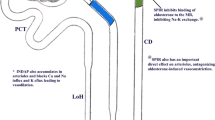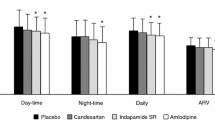Summary
The clinical efficacy and safety of ibopamine and diuretic therapy were compared in a multicenter, multinational, parallel, positive-controlled, randomized, double-blind, 12-week study, involving 103 patients with mild CHF (NYHA Class II). Body weight, NYHA functional class, symptom assessment scores, laboratory blood tests, and exercise testing were evaluated at baseline at interim visits and at the end of 12 weeks. Clinical events were monitored throughout the study.
There was no difference in any of the considered parameters between the two patient groups at baseline and at the end of the 12-week evaluation. A trend of improvement in clinical conditions that did not reach statistical significance was noted in each group throughout the study, as a probably „trial effect.”
Five patients on ibopamine had severe clinical events leading to drug discontinuation (CHF worsening, ventricular tachycardia, elevation of liver transaminases, headache, gastrointestinal disorders) and five on diuretic therapy experienced serious side effects (skin rash, palpitation, atrial fibrillation, elevation of liver transaminases, manic episode). One patient died while on diuretic therapy. Only headache and skin rash were considered to be related to the therapy (ibopamine and diuretic therapy, respectively). Our trial suggests that ibopamine can be safely and effectively used as an alternative for diuretics for up to 3 months in patients with mild CHF.
Similar content being viewed by others
References
The Consensus Trial Study Group. Effect of enalapril on mortality in severe congestive heart failure.N Engl J Med 1987; 316:1429–1435.
Cohn JN, Archibald DG, Ziesche S, et al. Effect of vasodilator therapy on mortality in chronic congestive heart failure.N Engl J Med 1986; 314:1547–1552.
Delaney V, Bourke E. Diuretics. In: Hurst JW (ed.)The Heart, 6th ed. New York: McGraw-Hill, 1986:1657–1667.
Guyatt GH. The treatment of heart failure: A methodological review of the literature.Drugs 1986; 32:538–568.
Yusuf S, Wittes J, Friedman L. Overview of results of randomized clinical trials in heart disease.JAMA 1988; 260:2259–2263.
Casagrande C, Ghirardi P, Marchetti G. Ibopamine.New Drugs Annual: Cardiovasc Drugs 1985; 3:173–196.
McKee PA, Castelli WP, McNamara M, Kennel WB. Criteria for diagnosis of congestive heart (cardiac) failure.N Engl J Med 1971; 285:1441–1446.
Lipkin DP, Poole-Wilson PA. Treatment of chronic heart failuire: A review of recent drug trials.Br Med J 1985; 291:993–996.
Mulrow CD, Mulrow JP, Linn WD, et al. Relative efficacy of vasodilator therapy in chronic congestive heart failure.JAMA 1988; 259:3422–3426.
Furberg CD, Yusuf S. Effect of drug therapy on survival in chronic congestive heart failure.Am J Cardiol 1988; 62:41A-45A.
Freis ED. The cardiovascular risks of thiazide diuretics.Clin Pharmacol Ther 1986; 39:239–244.
Holland OB, Nixon JV, Kuhnert L. Diuretic-induced ventricular ectopic activity.Am J Med 1981; 70:762–768.
Caralis PV, Perez-Stable E. Electrolyte abnormalities and ventricular arrhythmias.Drugs 1986; 31 (Suppl 4):85–100.
Carvalho Filho ET. Diuretic therapy in congestive heart failure for the elderly patient.Drugs 1986; 31 (Suppl 4):165–173.
Cavalli A, Riva E, Schleman M, et al. Ibopamine as a substitute for digitalis in patients with congestive heart failure on chronic digoxin therapy.Int J Cardiol 1989; 22:381–387.
Riva E, Cavalli A, Abbondati G, et al. Ibopamine: Longterm safety study in patients with congestive heart failure.Int J Clin Pharmacol Res 1989; 9:21–28.
Fonseca C, Gouvoia R, Mota E, et al. Safety and efficacy of ibopamine in congestive heart failure during two years of follow-up treatment.Europ Heart J 1988;9 (Suppl1): 178:(Abstract).
Author information
Authors and Affiliations
Consortia
Rights and permissions
About this article
Cite this article
SK & F Ibopamine Working Group., Riva, E., Abbondati, G. et al. Ibopamine versus hydrochlorothiazide/amiloride in patients with mild congestive heart failure. Cardiovasc Drug Ther 3, 897–902 (1989). https://doi.org/10.1007/BF01869579
Issue Date:
DOI: https://doi.org/10.1007/BF01869579




